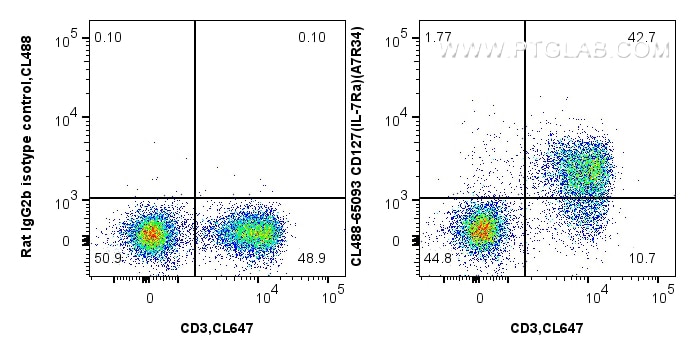Tested Applications
| Positive FC detected in | mouse splenocytes |
Recommended dilution
| Application | Dilution |
|---|---|
| Flow Cytometry (FC) | FC : 1 ug per 10^6 cells in 100 μl suspension |
| This reagent has been tested for flow cytometric analysis. It is recommended that this reagent should be titrated in each testing system to obtain optimal results. | |
| Sample-dependent, Check data in validation data gallery. | |
Product Information
CL488-65093 targets IL-7Ra/CD127 in FC applications and shows reactivity with mouse samples.
| Tested Reactivity | mouse |
| Host / Isotype | Rat / IgG2a, kappa |
| Class | Monoclonal |
| Type | Antibody |
| Immunogen |
IL-7Ra-IgG1 fusion protein Predict reactive species |
| Full Name | interleukin 7 receptor |
| GenBank Accession Number | BC089571 |
| Gene Symbol | CD127 |
| Gene ID (NCBI) | 16197 |
| RRID | AB_2883173 |
| Conjugate | CoraLite® Plus 488 Fluorescent Dye |
| Excitation/Emission Maxima Wavelengths | 493 nm / 522 nm |
| Form | Liquid |
| Purification Method | Affinity purification |
| UNIPROT ID | P16872 |
| Storage Buffer | PBS with 0.09% sodium azide and 0.5% BSA, pH 7.3. |
| Storage Conditions | Store at 2-8°C. Avoid exposure to light. Stable for one year after shipment. |
Background Information
CD127, also known as IL-7R subunit alpha (IL-7Rα), is a type I membrane glycoprotein expressed on thymocytes, B cell precursors, most T cells, and some lymphoid and myeloid cells (PMID: 8415665). IL-7R is a heterodimer composed of CD127 and IL-2Rγ (CD132), which is a common gamma chain shared by the receptors of various cytokines, including interleukins 2, 4, 7, 9, and 15 (PMID: 8266077; 9862091). IL-7R plays critical roles in lymphocyte development and homeostasis (PMID: 26336149). CD127 can also act as a receptor for thymic stromal lymphopoietin (TSLP) (PMID: 10974032).
Protocols
| Product Specific Protocols | |
|---|---|
| FC protocol for CL Plus 488 IL-7Ra/CD127 antibody CL488-65093 | Download protocol |
| Standard Protocols | |
|---|---|
| Click here to view our Standard Protocols |




